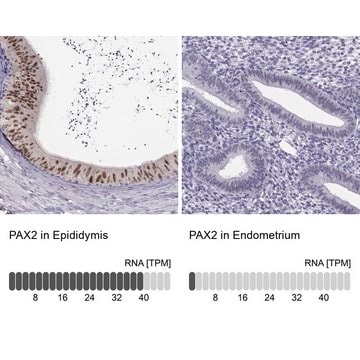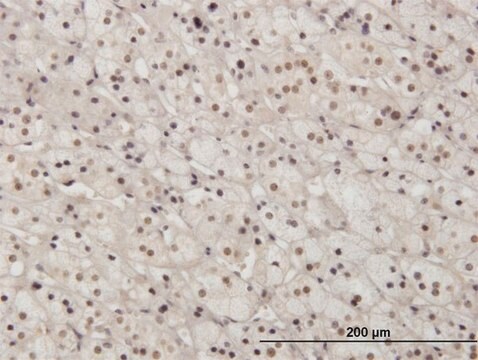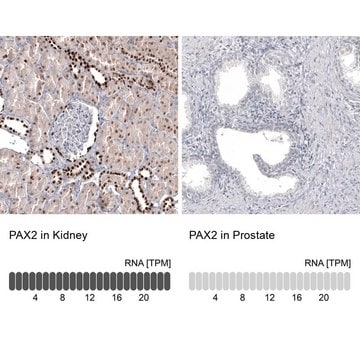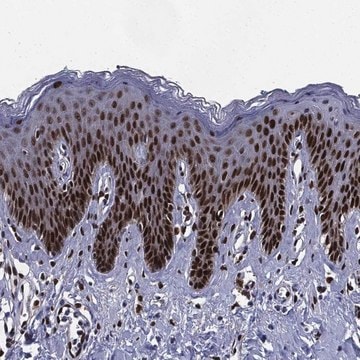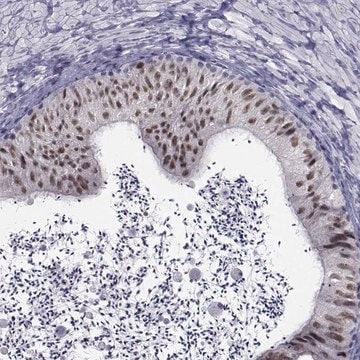MABE902
Anti-Pax-2 Antibody, clone 4C2.2
culture supernatant, clone 4C2.2, from mouse
Synonym(s):
Paired box protein Pax-2, Pax-2
Sign Into View Organizational & Contract Pricing
All Photos(2)
About This Item
UNSPSC Code:
12352203
eCl@ss:
32160702
NACRES:
NA.41
Recommended Products
biological source
mouse
Quality Level
antibody form
culture supernatant
antibody product type
primary antibodies
clone
4C2.2, monoclonal
species reactivity
human
technique(s)
western blot: suitable
isotype
IgG2bκ
NCBI accession no.
UniProt accession no.
shipped in
wet ice
target post-translational modification
unmodified
Gene Information
human ... PAX2(5076)
General description
Paired box protein Pax-2 (UniProt Q02962; also known as Paired box homeotic gene 2) is encoded by the PAX2 (also known as FSGS7, PAPRS) gene (Gene ID 5076) in human. Pax-2 belongs to the family of transcription factors with conserved DNA-binding paired box domain. The family of paired box (PAX) genes is divided into four subgroups (I–IV). Genes in subgroups II (PAX2, PAX5, and PAX8) and III (PAX3 and PAX7) have been implicated in tumor development. PAX2 is a critical regulator of embryogenesis and it is normally expressed in the pancreas and in subpopulations of nodal lymphocytes in adult tissues. Aberrant PAX2 expression is frequently observed in several cancer types.
Specificity
Clone 4C2.2 is expected to react with spliced Pax-2 isoform 1 and isoform 2 (Fetal kidney isoform). Reactivity toward isoforms 3&4 has not been tested.
Immunogen
GST-tagged recombinant protein corresponding to human Pax-2.
Application
Research Category
Epigenetics & Nuclear Function
Epigenetics & Nuclear Function
Research Sub Category
Nuclear Receptors
Nuclear Receptors
This Anti-Pax-2 Antibody, clone 4C2.2 is validated for use in Western Blotting for the detection of Pax-2 .
Western Blotting Analysis: A 1:500 dilution from a representative lot detected PAX-2 in 10 µg of HeLa and PC3 cell lysate.
Quality
Evaluated by Western Blotting in A431 cell lysate.
Western Blotting Analysis: A 1:500 dilution of this antibody detected PAX-2 in 10 µg of A431 cell lysate.
Western Blotting Analysis: A 1:500 dilution of this antibody detected PAX-2 in 10 µg of A431 cell lysate.
Target description
~45 kDa observed. ~45 kDa observed. Isoform 1 (44.7 kDa calculated); Isoform 2 (44.5 kDa calculated). An uncharacterized band ~17 kDa is seen in some lysate samples.
Physical form
Mouse monoclonal IgG2bκ antibody in buffer containing supernatant without preservatives.
Unpurified
Storage and Stability
Stable for 1 year at -20°C from date of receipt.
Handling Recommendations: Upon receipt and prior to removing the cap, centrifuge the vial and gently mix the solution. Aliquot into microcentrifuge tubes and store at -20°C. Avoid repeated freeze/thaw cycles, which may damage IgG and affect product performance.
Handling Recommendations: Upon receipt and prior to removing the cap, centrifuge the vial and gently mix the solution. Aliquot into microcentrifuge tubes and store at -20°C. Avoid repeated freeze/thaw cycles, which may damage IgG and affect product performance.
Other Notes
Concentration: Please refer to lot specific datasheet.
Disclaimer
Unless otherwise stated in our catalog or other company documentation accompanying the product(s), our products are intended for research use only and are not to be used for any other purpose, which includes but is not limited to, unauthorized commercial uses, in vitro diagnostic uses, ex vivo or in vivo therapeutic uses or any type of consumption or application to humans or animals.
Not finding the right product?
Try our Product Selector Tool.
Storage Class Code
10 - Combustible liquids
WGK
WGK 1
Flash Point(F)
Not applicable
Flash Point(C)
Not applicable
Certificates of Analysis (COA)
Search for Certificates of Analysis (COA) by entering the products Lot/Batch Number. Lot and Batch Numbers can be found on a product’s label following the words ‘Lot’ or ‘Batch’.
Already Own This Product?
Find documentation for the products that you have recently purchased in the Document Library.
Our team of scientists has experience in all areas of research including Life Science, Material Science, Chemical Synthesis, Chromatography, Analytical and many others.
Contact Technical Service